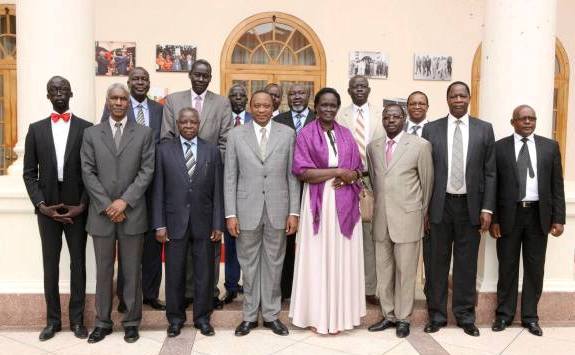SPLM seven to join Addis Ababa talks: IGAD
By Tesfa-Alem Tekle
February 12, 2014 (ADDIS ABABA) – The seven South Sudanese political leaders recently released from detention in Juba accused of being involved in an alleged coup attempt in December and flown to Kenya at the end of January will arrive in the Ethiopian capital, Addis Ababa, late on Wednesday, according to mediators.

“The released political leaders, who had been expected to attend the official launch yesterday, are now on their way from Nairobi and expected to arrive in Addis Ababa tonight accompanied by the Ethiopian Ambassador to Kenya” IGAD, the East African bloc brokering South Sudanese peace talks said in a statement released on Wednesday.
Seven out of the 11 former senior officials from South Sudan’s ruling party – the SPLM – detained in connection with an alleged coup attempt were freed on January 29 after a ceasefire agreement was signed in Addis Ababa on 23 January between the South Sudanese government and rebels who have named themselves the SPLM/A In Opposition.
However Juba has refused to release four of the senior SPLM figures, including Pagan Amum, the party’s former secretary general who has been sacked by South Sudan’s President Salva Kiir.
The four detainees along with former vice-president and current rebel leader, Riek Machar, are facing charges of treason. All the accused deny the government’s allegations that attempted to overthrow the Kiir on December 15.
Kenya’s government on Sunday refused to allow the seven leaders permission to travel to Ethiopia to take part at the second round of negotiations, arguing their bail terms meant they were not allowed to leave Kenyan territory.
After Nairobi decision, rebel negotiators in Addis Ababa threatened to boycott the fresh round of talks.
On Wednesday Kenyan President Uhuru Kenyatta met with the seven former detainees, who have been joined by Rebecca Garang the widow of the late the SPLM’s former leader John Garang and his son Grang Demebiar.
Garang was not arrested but she was part of the group who described President Kiir as “increasingly dictatorial” at a press conference in earlier December.
Kenyatta said he was sending Kenya MP Dalmas Otieno, a former Cabinet Minister, “as an envoy to help them during the process”.
LEADERS WON’T TAKE SIDES
It is not yet clear whether the seven political figures will ally themselves with rebels or emerge as a separate party. Rebel officials in Addis Ababa have declined to comment on the issue when they are asked by Sudan Tribune.
Also, Machar spokesperson, James Dak, said their main concern was to ensure their release and freedom to travel to Addis Ababa and join the political dialogue. “Whether they will join us, or join the other party, or stay neutral is their right to decide as a group or individual leaders,” he further said.
However, IGAD chief negotiator, Seyoum Mesfin, said the former detainees are seeking to form a “third block” rather than taking side.
“They rather would like us to prepare a sort of a triangular table for their negotiations,” Seyoum told reporters.
Speaking to Sudan Tribune, Haile Girma, a political analyst, however said he doubts the seven leaders due to join talks tomorrow would “deny” Machar’s delegation which secured their release.
Ahead of the arrival of the seven SPLM leaders, IGAD mediators today were separately consulting with delegations of the two warring parties and other stakeholders.
“In addition, the envoys also received a preliminary report from the advance team of the IGAD Joint Technical Committee that has been conducting the pre-deployment assessment for the monitoring and verification mechanism” said IGAD.
“Some members of the team continue with the assessment mission, especially in the opposition-held areas” it added.
A week ago, IGAD deployed a team of ceasefire monitors from Ethiopia Kenya and Sudan as well as from the two South Sudanese factions to evaluate the implementation of the truce.
HUMANITARIAN CRISES
Despite a ceasefire agreement signed between the South Sudan government and rebels led by Riek Machar, the peace pact has not stopped the fighting on ground.
The conflict in South Sudan, which erupted nearly two months ago has claimed the lives of an estimated 10,000 people and displaced nearly a million people, causing a huge humanitarian crises.
The conflict has made it extremely difficult to deliver emergency aid supplies.
The UN said on Wednesday that the humanitarian crises in South Sudan is a ‘level three emergency’, the highest level under the UN’s categorisation, putting the East African nation on the same level to that of the humanitarian crises in Syria.
Both warring sides have failed to implement the cease fire agreement and have repeatedly traded accusations that the other has violated the ceasefire deal.
Uganda’s military presence, which has also been a setback to the implementation of the ceasefire deal, with rebels repeatedly calling for their withdrawal. The presence of the Ugandan People’s Defence Force have proved controversial as Uganda is a member of IGAD, the body mediating the talks.
Ethiopia is the first IGAD member to call for the UPDF to leave South Sudan, with prime minister, Hailemariam Desalegn, on Tuesday saying his country is against the presence of any foreign forces in South Sudan.
(ST)
